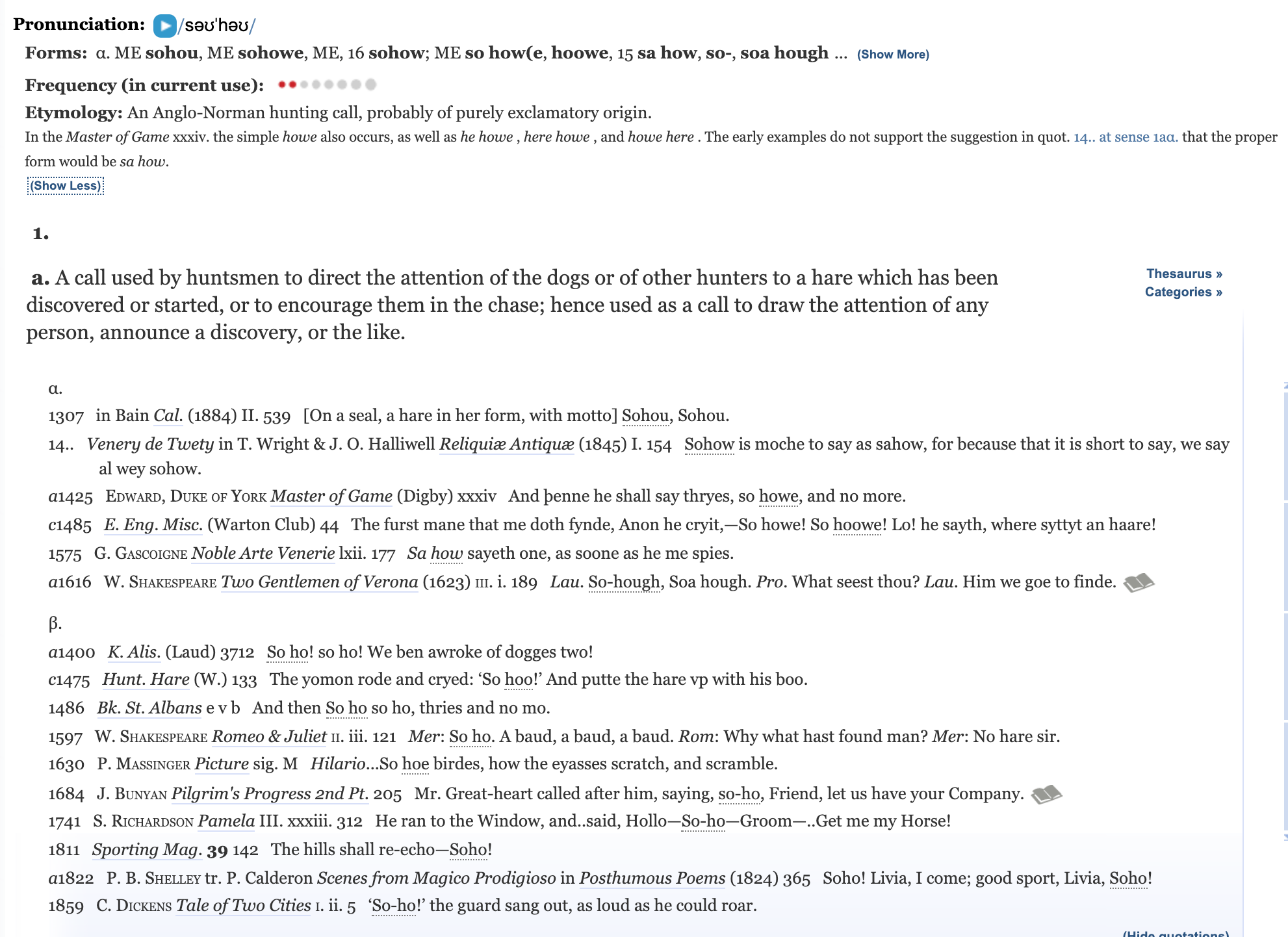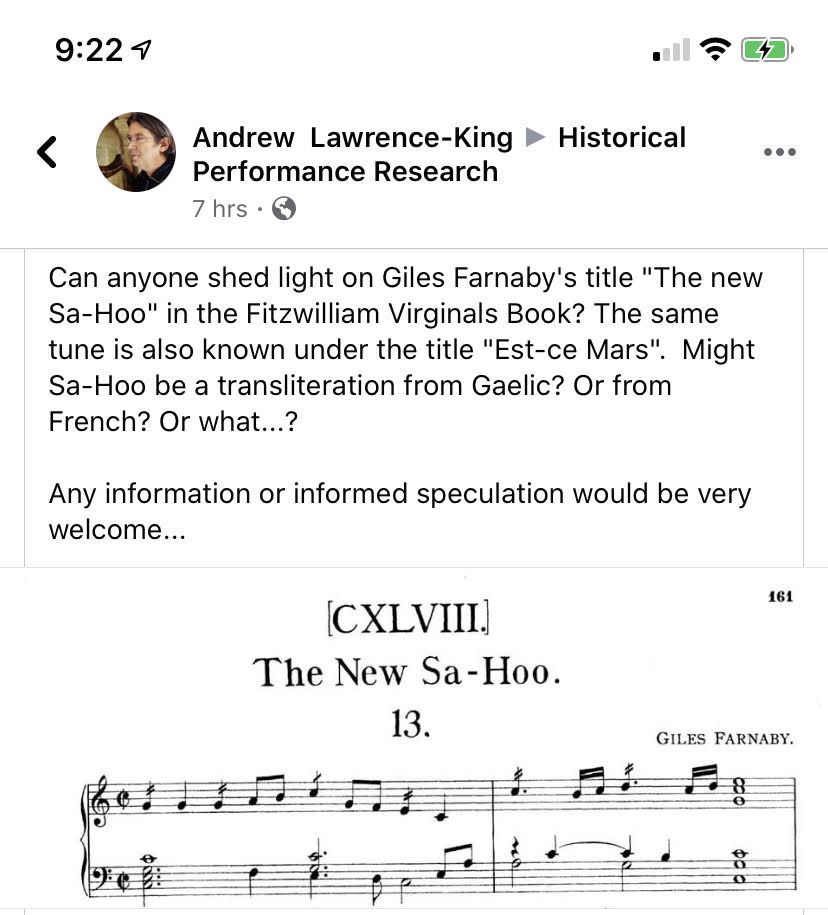Ask Language Log: The new Sa-Hoo?
« previous post | next post »
Update — following a suggestion in the comments, here's the OED's entry for soho:

August 22, 2020 @ 12:14 pm · Filed by Mark Liberman under Language and music
« previous post | next post »
Update — following a suggestion in the comments, here's the OED's entry for soho:

August 22, 2020 @ 12:14 pm · Filed by Mark Liberman under Language and music
Powered By WordPress

jhh said,
August 22, 2020 @ 12:24 pm
Following…
Laura Morland said,
August 22, 2020 @ 12:45 pm
I vote for it being Gaelic, although Farnaby has Cornish roots. I just listened to a lovely version of "Est-ce mars?" (https://youtu.be/lR8wRR7pVGc) and no words in it would lend themselves to being anglicized as "Sa-hoo" (so far as I could tell).
The French version, an "air of the court," is attributed to the composer Pierre GUÉDRON (1566 ca-1620 ca), which makes him of the same generation as Farnaby.
My late husband, the (English and) Celtic scholar Brendan O Hehir, might well have been able to answer your question — so you might cast your net in the direction of living scholars of Irish or Scottish Gaelic.
P.S Apparently Farnaby had a penchant for amusing song titles; other virginals are named "Put Up Thy Dagger, Jemy" and "Wooddy-Cock".
Tony Spataro said,
August 22, 2020 @ 2:10 pm
"Sa-hoo" is possibly a _very_ poor attempt at pronouncing Samhain / Sauin, the gaelic autumn harvest festival.
Of course, "est-ce mars" has a very springtime sound to it: "is it March [yet]?" Springtime would correspond to the Beltaine festival. On the other hand, the _new_ Samhain might be construed Beltaine.
This all seems like quite a stretch, so I doubt "sa-hoo" is intended as a reference to Samhain; there is probably a better explanation that's off limits to me given my extremely rudimentary knowledge of gaelic languages.
David B Solnit said,
August 22, 2020 @ 3:04 pm
Getting a bit tangential, but … Mars in Est-ce mars is the god, not the month: the first line of the song is "Est-ce Mars le grand dieu des alarmes que je vois?" (Is it Mars the great god of alarms that I see?).
Long ago and far away I played the harpsichord and the English virginalists were among my favorites.
Antoon said,
August 22, 2020 @ 3:13 pm
The Irish word that came to mind was “saothar”, i.e. work (including “opus”) – the “th” is pronounced “h”. So Farnaby’s title would be “the New Work” – a little advertising slogan. But the vowels seem all wrong (no idea how it would have been pronounced in Irish in that era).
The mix of English and Irish seems odd – but then again there is the very different “Irish Ho-Hoane” in the first volume of the Fitzwilliam Virginal Book; I was puzzled about that title until I learned that it is generally understood as an attempt to transcribe “ochón”, a cry of grief or a lament; and that tune certainly seems to be a lament, nicely recorded by among others Andrew Lawrence-King’s Harp Consort: https://www.youtube.com/watch?v=T2IX4T7Tb5Y
The best known keyboard version is by Jan Pieterszoon Sweelinck, a contemporary of Farnaby’s (and an occasional interloper in the FVB). In looking up some information, I ran across in an article by one Herbert Antcliffe from the mid-1930’s with a bit of the history of the tune, in case somebody wants to play around with other possible sources of “sa-hoo”…:
"The vigour and variety which Sweelinck was able to impart, given only a suitable melody, we can see in the best known of the ten sets which he wrote. This is based on a folk melody of which the origin is unknown. It was, as it still is, popular in Holland as a sea-song, Wie gaat mee, over de zee ? Houd het roer recht ! which has a moral as well as a travel significance. It is also associated in the arrangement of Valerius with a religious song, Gelukkig is hij die leert sterven, Terwijl hij leeft. Probably, however, it came to Holland from France, where it is known as coupled with the song Est-ce Mars, le grand Dieu des alarmes, que je voy. In England it was treated less seriously and the best-known words to which it was sung began with the pleasant expression that "Slaves to the world should be toss'd in a blanket." Giles Farnaby used it in his variations, in the Fitzwilliam Virginal Book, on The New Sa-hoo…”
Keith Clarke said,
August 22, 2020 @ 3:49 pm
@Antoon: Further to Valerius and the idea that this may have originated as a sea-song (English? On which Farnaby wrote variations?) – https://www.ibiblio.org/fiddlers/WH_WHE.htm has short paragraph: "WHAT HIGH OFFENCES HAS MY FAIR LOVE TAKEN. The melody appears in the Skene Manuscript, c. 1615, but, according to Samuel Bayard (writing in his article 'A Miscellany of Tune Notes') is not Scottish. Florimond van Duyse, in Het Oude Nederlandsche Lied, II (Amsterdam, 1905), identifes it as a set of a French tune, 'Est-ce Mars, le grand dieu des alarmes,' printed in Adruaen Valerius’ Nederlandtsche Gedenck-Clanck (1626). Coming almost full circle, however, the 1943 editor of Valerius maintains that it is the air of an even older English seaman’s song, 'The new Sa-hoo.'"
Paul Turpin said,
August 22, 2020 @ 4:05 pm
For what it might be worth here's a martial Sahu… https://en.wikipedia.org/wiki/Gazi_Saiyyed_Salar_Sahu
Martin Taylor said,
August 22, 2020 @ 4:32 pm
My son David has provided me with the following, which may be of interest.
—
I have seen that title before in front of me on my music stand… But not in any comprehending way.
I assumed when seeing it that it might have been a hunting call – "so-ho", as in the London placename. Looking online, I see that that etymology for Soho is not as certain as I had thought: https://londonist.com/2015/12/how-did-soho-get-its-name – but no alternative etymology seems more credible.
Giles Farnaby (~1563-1640) was contemporaneous with the creation of the collection that this image is taken from, the FitzWilliam Virginal Book, which contains music written up to the year 1612 (https://en.wikipedia.org/wiki/Fitzwilliam_Virginal_Book). This was exactly the period when the London Soho was being converted from hunting fields to a new urban area. Could the title relate to the London area? Farnaby lived in London twice in his life (https://en.wikipedia.org/wiki/Giles_Farnaby), though not in that area – some 20 minutes walk to the east in Cripplegate and Westcheap. The French title given seems 'Springy' – perhaps the onset of hunting season? Much conjecture, little fact, sorry.
Worth noting that the comment regarding Farnaby having a penchant for 'out there' names for his compositions isn't quite on the money – such names as cited tended to be the names of ballad/folk songs that the virginals composer had written variations on the melody to. However, Farnaby definitely had a playful musical streak – witness "His Dreame", "His Rest", and "His Humour" in the same collection; in the last of these he musically satirises several other compositional forms of the day.
Don't know if that's of any assistance? I feel certain that the denizens of the site you link to will have greater linguistic resources than I to call on… Though I do at least know the FWVB fairly well.
Tye Power said,
August 22, 2020 @ 7:58 pm
Is it connected to the pig call, "sooey"? https://www.merriam-webster.com/dictionary/sooey
Kate Gladstone said,
August 22, 2020 @ 10:13 pm
Sings this song is about someone spotting and pursuing a possible romantic/sexual partner (then being disappointed when “he” turns out to be female), could the underlying metaphor indeed be simply that of a hunt or chase?As I see it, that would explain the title at least as well as any of the much more convoluted theories posted here.
rosie said,
August 23, 2020 @ 11:42 am
@Tye Power Would that be "sui"? (A pig being an animal sui generis.)
Lars said,
August 23, 2020 @ 2:41 pm
There's an answer now in the original FB thread, which the author has apparently accepted.
https://www.facebook.com/photo.php?fbid=2701203640100036&set=a.1395210907365989&type=3&theater
see the answers by Aviad Stier.
maidhc said,
August 23, 2020 @ 6:22 pm
That link is blocked for me.
Can someone summarize the answer?
Antoon said,
August 23, 2020 @ 9:58 pm
The accepted answer was basically exactly what Mark Liberman copied above from the OED – a hunting call. So Martin Taylor’s son hit upon the most convincing solution.
In case it's of interest: the end of the first line of Farnaby’s melody is slightly different from all the other versions I've found (including the recording Laura Morland mentions, the Sweelinck variations set, and those helpfully mentioned by Keith Clarke above) – instead of E-F-G, Farnaby has G-F-E. The FVB has many copying slips (including in this piece); but this melodic flip isn’t likely to be one of them, as Farnaby’s embellished repetition just after has the same shape. So maybe Farnaby just slightly misremembered the tune; or treated it creatively; or was referring to a different source…
maidhc said,
August 24, 2020 @ 1:04 am
The hunting call seemed like the most likely explanation when I first saw it.
Brewer's Dictionary of Phrase and Fable has an extensive entry on "So-ho".
Thanks
DaveK said,
August 24, 2020 @ 5:55 pm
In King Lear, Act IV, Scene 6:
Then there's life in't. Nay, if you get it, you
shall get it with running. Sa, sa, sa, sa.
It’s glossed as a cry to urge on hounds, so the title probably is a hunting cry